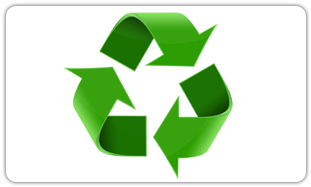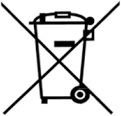Our Recycling
Waste Electrical and Electronic Equipment recycling (WEEE)


Our team disposes over 1000 products a day, supporting the WEEE directive. We only charge for the cost of transporting the item to be disposed.
The majority of customers who choose disposal also opt for our disconnection service when available. If you've selected our cooking or TV installation service, disconnection is already included.
All new electrical and electronic equipment we sell can be recycled! You can tell because our products include a 'crossed out wheeled bin symbol' like this
Even if your old product doesn't have the 'crossed out wheeled bin' symbol, the good news is well gladly accept and recycle your old electrical and electronic equipment to the best of our ability.


BENEFITS OF RECYCLING
Recycling unwanted electrical products is better for the environment. Lead and other toxins contained in electrical goods can cause soil and water contamination. This can have a very harmful effect on the natural habitat, wildlife and also human health. When situated near populated areas these toxins can cause problems to communities as their water and soil is polluted.
Many of the electrical items that we throw away can be repaired or recycled. Recycling items helps to save natural resources and also reduces the environmental and health risks associated with sending waste electrical goods to landfill.
The Waste Electric and Electronic Equipment (WEEE) Regulations 2013 became law in the UK on the 1st of January 2014 and replaced the 2006 Regulations. The new Regulations transpose the main provisions of Directive 2012/19/EU on WEEE which recasts the previous Directive 2002/96/EG. These regulations also provide for a wider range of products to be covered by the Directive with effect from 1st January 2019.
Further information on the WEEE Regulations 2013 can be found in the Government Guidance Notes produced by the Department for Innovation and Skills.
Treatment of WEEE
Large household appliances (e.g. ovens, fridges, washing machines) currently make up over 40% of WEEE but there are large volumes of other equipment such as IT equipment (mainly computers), TVs (over two million discarded each year), small household appliances (e.g. kettles and hair dryers), electrical tools. digital watches, electronic toys and medical devices.
Such items contain a wide variety of materials e.g. an average TV contains 6% metal and 50% glass, whereas a cooker is 89% metal and only 6% glass. Other materials found include plastics. ceramics and precious metals.
Asa result of this complex mix of product types and materials, some of which are hazardous (including arsenic, cadmium, lead and mercury and certain flame retardants) WEEE recycling poses a number of health risks that need to be adequately managed. For example, exposure to substances released during processing (such as mercury released from fluorescent tubes, lead and phosphorous pentachloride as a result of breaking cathode ray tubes).
It is important to stress that if effective measures are taken to control exposure to mercury and lead then normally the control of exposure to other hazardous substances should also be adequate.
The exact treatment of WEEE can vary enormously according to the category of WEEE and technology that is used. Some treatment facilities utilize large-scale shredding technologies, whilst other use a disassembly process, which can be manual, automated or a combination of both.
We offer a collection service on a like for like basis. for example if you buy a washing machine we can take away your old one. All the appliances we collect are then sent to be recycled. Please note there may be a small charge for all refrigeration appliances. Please ensure that your old cooling appliance has been defrosted and is free from any water before we take it away.
The Sirius Group are proud to be environmentally friendly and support this great initiative.

